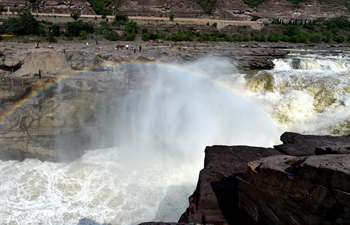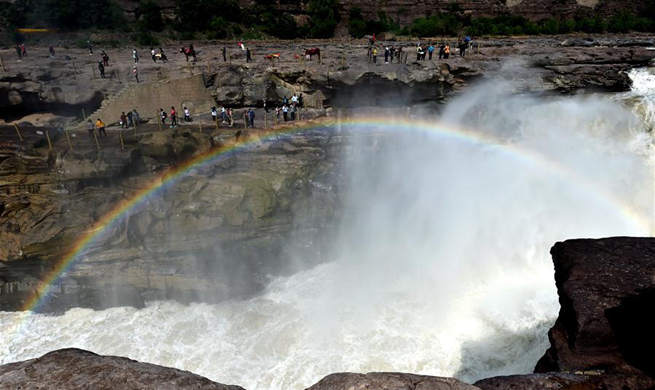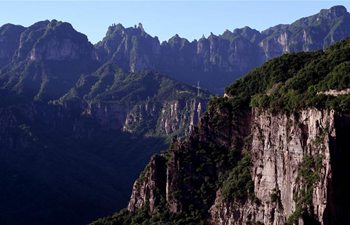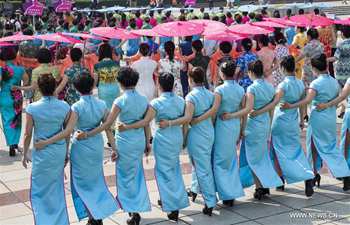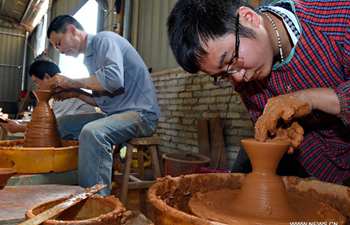LANZHOU, May 23 (Xinhua) -- Across the vast Qilian mountain range in northwest China, facing the demolished ruins of what was once his mine, Jin Xiuliang cried out loud.
Jin, in his 50s, was the last owner of Xiaquangou Mine, which, until its closure in January, was based in the vast, picturesque national reserve that includes natural sites such as the Qilian Mountains.
"The mine was closed, the waste treated and the workers' dorm demolished," Jin said. "But I understand, it is for the sake of the environment."
The Qilian Mountains stand on the border of the provinces of Gansu and Qinghai. The nature reserve was designated a national protected site in 1988, but hundreds of mines in the area, and all kinds of construction projects, continued to take their toll on the environment.
An ecological restoration campaign was launched in October 2015 across the reserve, which covers close to two million hectares, with construction projects under close scrutiny and mines being decommissioned.
According to government figures released this year, the fates of more than 200 projects, including over 60 mines, are still uncertain.
The Qilian Mountains are known as the "Mother Mountains" by the people of Gansu. The snow and glaciers of the range water the Hexi Corridor, or Gansu Corridor, an important waterway for traders to transport their wares along the ancient Silk Road.
The corridor remains important to this day -- more than five million people who live along the Heihe, Shiyang and Shule rivers depend on the mountains for their water.
The mountains are known for their natural resources, hence the abundance of mines. Mining is often seen as a fast way to make money. Since the 1970s, the number of mines have mushroomed across the mountain ranges, particularly in the reserve.
"In the peak year of 1997, 824 mines opened in Zhangye, Gansu, of which 770 were in the nature reserve," according to a local resource development official, who declined to be named.
Decades of logging, mining, the building of factories and even tourism, have all had adverse effects on the reserve, including water loss, soil erosion and subsidence.
"If you walk deep into the reserve, you see breathtaking vistas, but you can also see the damage done by the mines," said Fang Yintian, former director of the standing committee of the local legislature. "These are the direct results of over exploitation."
The authorities have not been blind to the destruction caused by all this "development." In September 2015, the Ministry of Environmental Protection summoned the reserve managers for talks. It was as a result of this meeting that Jin Xiuliang's mine, among others, was ordered to close. Despite the directive, the mine owner had just renovated the workers' dorms, and delayed the full closure until earlier this year.
The reserve also includes part of the neighboring province of Qinghai, and mines on reserve land have also been closed down there.
HEALING THE "MOTHER MOUNTAINS"
Ma Peiren has been a mountain ranger since he was 17. He often climbs the snow-peaked mountains to interact with miners, poachers and loggers.
"Some locals comb the mountains to collect medicinal herbs -- we have to stop even them," said Ma, who is now 55. "It's tough, but my job is to protect the forest."
Years of patrolling the forests have left Ma with arthritic knees that creak and complain with every step. He wears out eight to nine pairs of shoes each year, and has a story or two to tell about encounters with wolves.
More than 700 forest rangers like Ma patrol the mountains all year round, but undoing decades of damage requires more than just patrols and mine closures.
Farmers and herdsmen depend on their animals to make a living.
If you want to live a good life, you should "raise more cows and sheep," said Chang Haixian, a resident of Sunan Yugu Ethnic Autonomous County in Gansu.
"Our people have lived across the Qilian Mountains for a millennium, and livestock have helped to support our lives up here." said Chang. "The sad fact is, though, that if you keep the animals, you damage the plains."
To address this, residents of rural settlements across the Mother Mountains are being relocated. Hundreds of thousands of people have already moved to new villages and towns, but more await news about their new homes. The authorities will have to spend at least another 200 million yuan (29 million U.S. dollars) to build enough housing to finish the task.
"I'm sure, in time and with concerted efforts, that the mountains will heal," said Ma.






